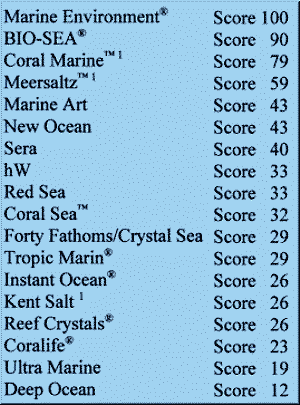|
A good marine salt is the first and most essential requirement
The majority of marine life sold to hobbyists does not survive to its full genetic life expectancy.
It is a fact that most amateur marine aquarium hobbyists believe it is hard to maintain a healthy saltwater aquarium. Why does this negative belief persist?
In reality, it is not difficult to keep and enjoy a healthy marine fish or reef aquarium. All you need is the proper information, products, and a little effort.
If you place your pets in a marginal environment, they live marginal lives. The composition of your saltwater is the single most important component of your marine fish or reef aquarium.
Nothing -lights, filters, foods, ozone, skimmers, supplements, controllers, etc. – can remedy bad saltwater.
A good marine salt should incorporate many essential factors to be considered acceptable for keeping a variety of delicate exotic marine life in captivity for extended periods.
A good marine salt should:
Similar to the major ions in natural seawater (NSW).
Score + 20.
2. Contain sufficient bromide. Evidence suggests there may be a beneficial synergistic relationship between bromide and iodide.
Contain bromide similar to NSW.
Score + 4.
3. Contain sufficient strontium. Strontium has an interaction with calcium and is essential for the growth and development of corals.
Contains strontium similar to NSW.
Score + 4.
4. Contain sufficient molybdate. Molybdate is beneficial for reef and marine fish aquariums.
Contains proper amounts of molybdate.
Score + 3.
5. Be low in phosphates. Phosphates are naturally occurring waste ions that increase with time in a closed system. Phosphates can foment the growth of undesirable non beneficial algae and degrade basic water quality.
Low in phosphates.
Score + 4.
6. Be low in silicates. High amounts of silicates can increase the growth of diatoms or brown algae.
Low in silicates.
Score + 3.
7. Be low in metals. Excessive amounts of metals can be devastating to closed marine fish or reef aquariums.
Low in metals.
Score + 5.
8. Be a dry formula. Wet or damp marine salts are usually unstable and mix to a high pH. They can take a long time to dissolve or mix completely.
Dry formula.
Score + 7.
9. Be of uniform particle size. A separation of ingredients during the manufacture, packaging, transporting and handling may result from non-uniform particle size marine salts.
Uniform particle size.
Score + 10.
10. Have contents that match the package claims. Many marine salt packages misinform hobbyists and dealers about the actual contents of their product.
Matching contents to package claims.
Score + 10.
11. Be consistent from package to package. Inconsistent or constantly deficient marine salt solutions may not be appropriate for long term keeping of many types of marine fish or delicate reef invertebrates.
Consistent formula.
Score + 10.
12. Mix to the proper pH. High pH when hydrated has no relationship to the pH holding abilities of marine salts. High pH can stress captive marine fish and sensitive reef invertebrates by producing a condition of osmotic imbalance. Toxic ammonia increases with high pH.
Mix to the proper pH.
Score + 10.
13. Contain slightly higher or enhanced amounts of calcium and strontium. Enhanced calcium and strontium levels can benefit many marine fish and reef invertebrates.
Enhanced amounts of calcium and strontium.
Score + 10.
A consistently formulated, uniform particle sized marine salt that is similar to NSW and is low in metals, phosphates, silicates and mixes to the proper pH are basic requirements for a good marine salt that can promote the success of marine fish or reef aquariums.
Key to score: Scores indicate weighting value of importance. However, all aspects and points should be considered important in comparing products to natural seawater (NSW). Scores indicated herein are not based on comparison between products, but to natural seawater.
Water quality starts with your water™ Information used in this evaluation is from the S-15 Report™. The S-15 Report™ was prepared by Anresco Laboratories, an independent third party laboratory. The majority of testing was performed by the University of Missouri, a US Government prime contract testing laboratory, Environmental Trace Substances Research Center, Dept. of Environmental Science & Technology.
1 Sample tested separately from the S-15™ Report™.
|
